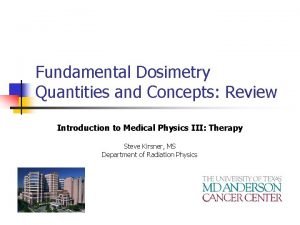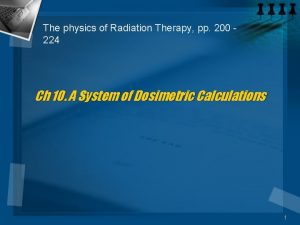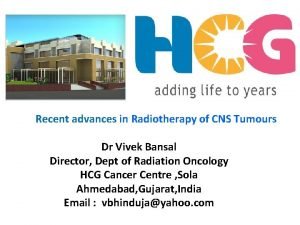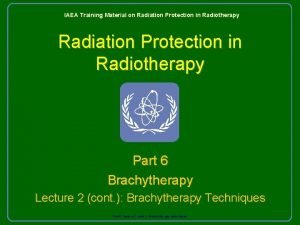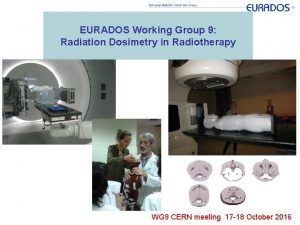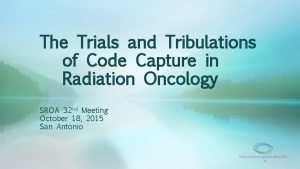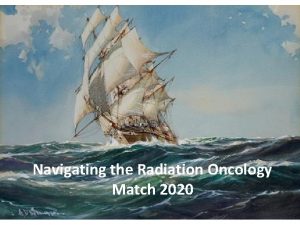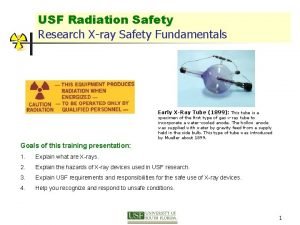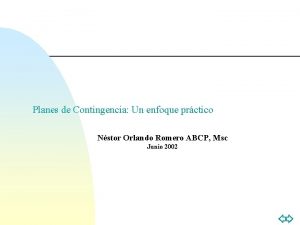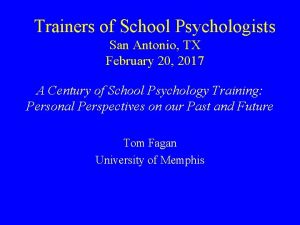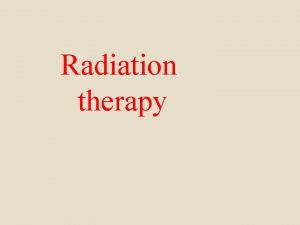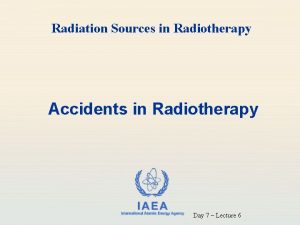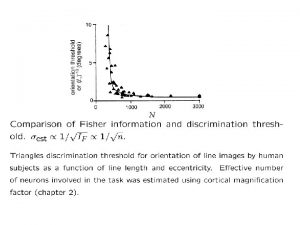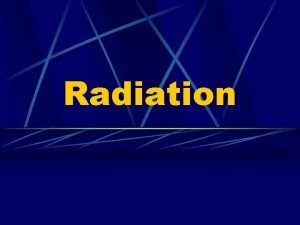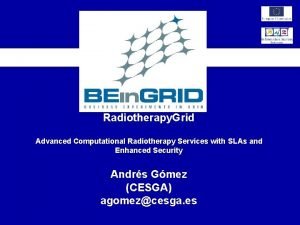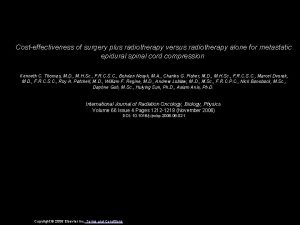Radiotherapy Site Accreditation Radiation Oncology Train the Trainers


















- Slides: 18

Radiotherapy Site Accreditation Radiation Oncology Train the Trainers Meeting Wednesday 24 th Feb 2021

Resources and Support Structures Medical Council criteria for the evaluation of training sites which support the delivery of specialist training (2014) Infrastructure of Training Sites – Training Curriculum / ESTRO guidelines Training Faculty: • Local/Hospital Training Coordinators (HTC) • The Consultant Trainer

Medical Council Criteria A. Clarity of educational governance arrangements Ø Clear structures, lines of accountability, level of reporting, with PG training bodies B. Clarity of clinical governance arrangements Ø Trainees made aware of responsibilities, local procedures C. Accountability Ø Named individual(s) on each site to ensure requirements met, collaboration, training etc D. Induction arrangements for trainees Ø Induction policy, health & safety, made aware of policies E. Clear supervisory arrangements for trainees Ø Made aware of clinical supervisors, take into account individuals and stage of training

Medical Council Criteria F. Opportunities for training through clinical practice for trainees Ø At appropriate level of competency, maximise opportunities for learning G. Access to formal and informal education and training for trainees Ø Work schedule according to training, attendance in formal education, avail informal education H. Opportunities for trainers to train through protected training time Ø I. Access to resources which support directed and self-directed learning Ø J. Work schedules, supported, facilitated to develop their role Sufficient study space, IT facilities, access to medical literatures Access to pastoral and health supports for trainees Ø Made aware of and have access to occ health, mental health, special needs supports

Medical Council Criteria K. Access to resources to maintain close contact with parent training bodies Ø L. Facilitated to maintain close contact, aware of primary point of contact Promotion of Medical Council guidance on professionalism, including promotion of current ethical guidance M. Safe working environment Ø Ongoing monitoring, EWTD working hours N. Specialty-specific supports Ø Sufficient resources to meet requirements, ensure remain fit-for-purpose O. Participation in on-call duty rota Ø Appropriate on-call ratio, supervision, post-call arrangements, accommodation

Medical Council Criteria P. Support for assessment of trainees Ø Facilitated at local level to participate in all assessments Q. Opportunities for multi-disciplinary teamwork Ø Local encouragement and promotion, opportunities to benefit from interaction with colleagues across healthcare delivery R. Opportunities for trainees to provide feedback to employing authority Ø Provide feedback, actively sought and encouraged

Infrastructure • Mega voltage machines available, at least one with high-energy electrons, equipped with IGRT and able to deliver IMRT • Access to a dedicated CT-scanner • Computerised treatment planning and technical support • Radiotherapy protection equipment • Access to regular Multidisciplinary Tumour Boards (MDTs) • Appropriate patient treatment aids • The opportunity to become at least familiar with brachytherapy and stereotactic RT

Infrastructure • Beds for inpatients or at least sufficient access to them in other department • Facilities for systemic therapies • Facilities for supportive and palliative care • Quality control programmes for patient care, treatment decisions, follow-up and outcome in a range of cancer sites • An adequate case mix for each trainee should be ensured by continuous monitoring by means of a logbook.

Training Sites 1. Cork University Hospital, Cork 2. Galway University Hospital, Galway 3. St Luke’s Radiation Oncology Network (SLRON), Dublin SLRON consists of three centres: 1. St Luke’s Hospital Rathgar 2. St Luke’s Radiation Oncology Centre at St James’s Hospital 3. St Luke’s Radiation Oncology Centre at Beaumont Hospital Each Radiation Oncology trainee will rotate through different training sites during their five year program as required. The rotation of the trainees is organized by collaboration of the 3 sites to make sure trainees have adequate exposure.

Local/Hospital Training Coordinators (HTC) • To have overall educational and supervisory responsibility for the trainee in a given placement. • To ensure that an induction to the unit has been carried out. • To ensure that the trainee is familiar with the curriculum and assessment system relevant to the level or stage of training and undertakes it according to requirements. • To ensure that the trainee has appropriate day-to-day supervision appropriate to their stage of training. • To act as a mentor to the trainee and help with both professional and personal development.

Local/Hospital Training Coordinators (HTC) • To ensure that each trainee has a nominated Consultant Trainer for each placement. • If the trainee’s rotation is working with a single Consultant then that Consultant will be the trainee’s Consultant Trainer for that placement period. • If the trainee will be working for several Consultants during a rotation it is beneficial for the trainee that they have one individual Consultant who is their Consultant Trainer, this is frequently the Consultant that they spend the most time with or with whom they are being trained in a particular skill that they may not have exposure to again during their five years of training.

Local/Hospital Training Coordinators (HTC) • All of the Consultant Trainers will have agreed in advance to be involved with Trainee education. • To ensure that the trainee in consultation with their nominated Consultant Trainer complete a Personal Development plan, setting, agreeing, recording and monitoring the content and educational objectives of the placement. • To ensure that the trainee’s Consultant Trainer undertakes regular appraisals with the trainee (typically one at the beginning, middle and end of a placement) and create a written report.

Local/Hospital Training Coordinators (HTC) • Ensure that both parties agree to the outcome of these sessions and keep a written record. • To discuss the trainee’s progress with each Consultant (including their nominated Consultant Trainer) with whom a trainee spends a period of training and involve them in the in house assessments and formal end of year annual review process. • At the in house assessments, inspect the Trainee’s logbook and ensure that the trainee is making the necessary clinical and educational progress.

Local/Hospital Training Coordinators (HTC) • To ensure patient safety in relation to Trainee performance by the early recognition and management of those doctors in distress or difficulty. Put in place a plan for any trainee identified as having difficulties. • At each in house assessment, inform trainees of their progress and encourage trainees to discuss any deficiencies in the training programme, ensuring that records of such discussions are kept.

The Consultant Trainer is a Consultant Radiation Oncologist who has been identified by the Local Training Coordinator as being a trainee’s trainer for the duration of the trainee’s placement with that individual Consultant.

The Consultant Trainer is expected to: • Complete a Personal Development Plan with their trainee at the start of each placement; setting, agreeing, recording and monitoring the content and educational objectives of the placement. • Undertake regular appraisals with the trainee (typically one at the beginning, middle and end of a placement) and complete a written report with the trainee which the trainee will upload to Med. Hub.

The Consultant Trainer • Discuss the trainee’s progress with the Local Training Coordinator in advance of each in house assessment and prior to the formal end of year annual review process. • Ensure patient safety in relation to trainee performance. • Inform the Local Training Coordinator of any concerns or difficulties that may affect the trainee’s training.

Radiotherapy Site Accreditation Radiation Oncology Train the Trainers Meeting Wednesday 24 th Feb 2021
 Wedge factor radiotherapy
Wedge factor radiotherapy Ssd and sad technique in radiotherapy
Ssd and sad technique in radiotherapy Radiotherapy
Radiotherapy Radiotherapy
Radiotherapy Radiotherapy
Radiotherapy Siemens radiotherapy
Siemens radiotherapy Dr raymond wynn radiation oncology
Dr raymond wynn radiation oncology Bogardus radiation oncology billing
Bogardus radiation oncology billing Radiation oncology match
Radiation oncology match Ucla radiation oncology westwood
Ucla radiation oncology westwood Usf radiation oncology
Usf radiation oncology Hot site cold site warm site disaster recovery
Hot site cold site warm site disaster recovery Trainers app gymfed
Trainers app gymfed Kpi for trainers
Kpi for trainers Cdm trainers
Cdm trainers Look at your trainers
Look at your trainers Le caf trainers
Le caf trainers Trainers of school psychologists
Trainers of school psychologists Personal trainers: session 2
Personal trainers: session 2
